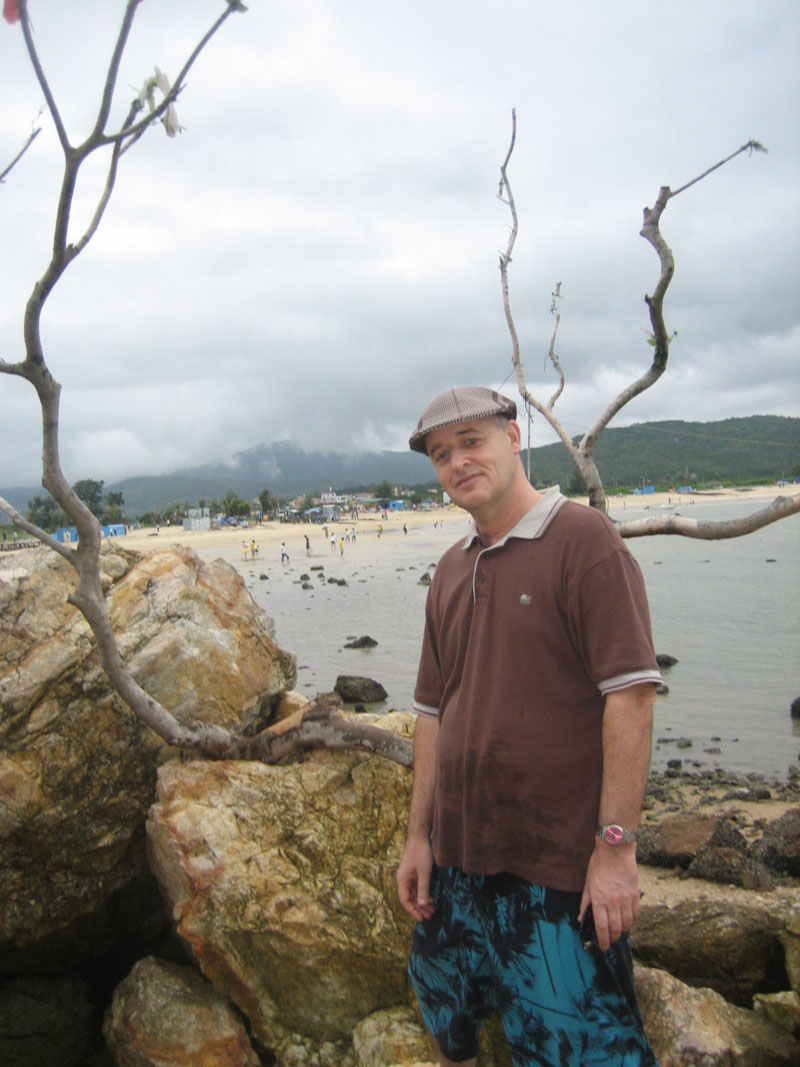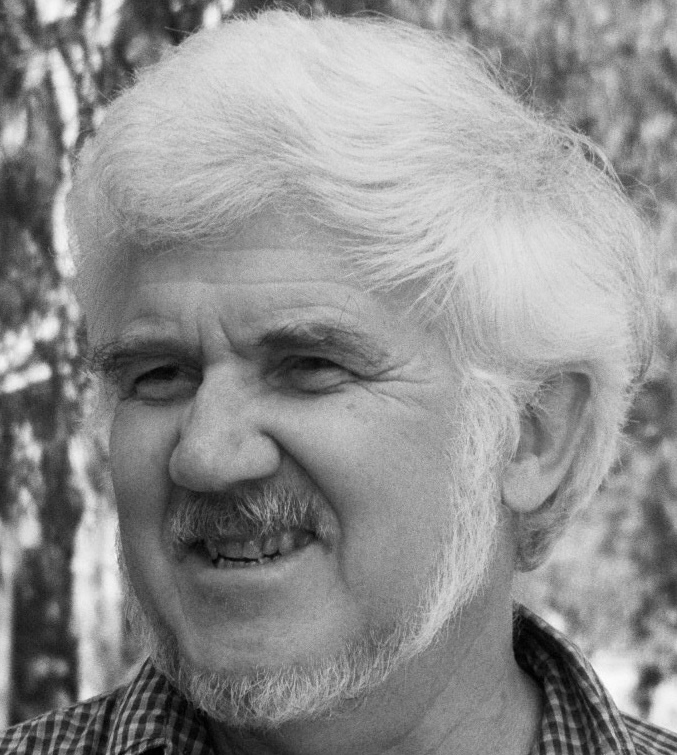Adam King
 Adam King grew up in Newcastle, Australia. For the past 15 years he has taught English—a decade or so in Osaka and, more recently, in Guangzhou.
Adam King grew up in Newcastle, Australia. For the past 15 years he has taught English—a decade or so in Osaka and, more recently, in Guangzhou.
Naaz
the cow likes the music rowing the sun down steps aflame ancient boatload of straw COOL BAR ice cream smile friend one rupee for bananas is it mister I thought and saw 3 boys hand in hand in hand at the flower market mornings evenings walking funny Broadway sweat a reservoir mama baba the onions in her purple bag is there anywhere to park under the water gut he stands over his tiny fire the doors the windows all blues big stitches returning soon too hot to write it down she wears the old chains night of the 10 Kingfishers beating white sheets 2 at a green table bamboo ladder and scaffold day at the races where they burn the bodies ok take the cake Adam’s building 1893 1 for you too on the roof lime and soda pink Ganesh opens all the trick locks welcome HOTEL SEALAND movie star glasses they let the vultures pick them to bits cricket crackling over the radio start at THE NAAZ thanks for that Suhail paper stars hang in dirt houses down by the sewer site CO-OPTEX SARI HALL Preeti the sun goes my eyes close what I’ve forgotten the stone men life on the back of a truck steel dust prize always a Wolfgang loudspeaker glimpse of a song a little love tale what else she can’t sit 12 years rust stand under the gateway my 1st Bristol smoke on a rope how many miles kilometres feet make a grey page on Marine Drive a red double-decker your super fast bus to 100 per cent shakti throwing sparks what time the boat he told me a lighter each year in Sri Lanka slow rosewater cart heat because o I would be a sparrow come here for your crumbs no need for keys cutlet menu bells silver biriyani a bundle of sticks your calling how could he carry that weight over and over where it fits hurts 1 word says it all for the broom prime minister calendar took a week the ferry ride Shiva help him up the bald scabby hill crane tell the 1st word to Mr Xmas on the taxi licence get the nets from last night’s tide remaining 1893 a is for auto rickshaw 1 coconut pink straw drink daughters barefoot bright about her it is not the colour of the bus I sing transport mode bike tyre marks cycling recycling the wheels of the living structure he is trying to shake Sister Hyacinth could she be ready his arm on the hip stance to attention salute the doorboy rice glue to seal this venture of the heart mud and cardboard you knew the whole deal crank getting a cutter fork I thought laughter when Sammy Seven played that wedding if it’s sincerity get the head nod turned off the nose knows no rose balloon in a torn shirt better empty bolted steel door impregnable barbed wire broken bottles reading grey wall scratches perhaps a cheetah fight the last guest I wrote in a notebook champion brand names from the gods anxious about the burns not hurting you run you expect to catch up the song getting lost around scrap corners painted eyes every day a new window blessing the narrative of the bus salesman all your brothers crows flew into my dream what was it just a chassis bubonic thunderstorm whipping tea in an arc dusk dawn daal to cultivate OM GEMS DK TIME LAKSHMI CEMENT the spray cry of a lotus the flies will ignore the circle you drew around your lunch cockroach chalk what is it called when the breath ends ananda you’re after toys the bus leaves a tree waves the cow likes the music
 Among SMS’s books of poems and poetic prose are, most recently, And then something happened (Salt, 2004), Dementia Blog (Singing Horse, 2008), and the forthcomingMemory Cards: 2010-2011 Series. She wrote A Poetics of Impasse in Modern and Contemporary Poetry (U of Alabama, 2005), and edits Tinfish Press out of her home in Kane`ohe, Hawai`i. She’s taught at the University of Hawai`i-Manoa for over two decades. Her blog can be found at
Among SMS’s books of poems and poetic prose are, most recently, And then something happened (Salt, 2004), Dementia Blog (Singing Horse, 2008), and the forthcomingMemory Cards: 2010-2011 Series. She wrote A Poetics of Impasse in Modern and Contemporary Poetry (U of Alabama, 2005), and edits Tinfish Press out of her home in Kane`ohe, Hawai`i. She’s taught at the University of Hawai`i-Manoa for over two decades. Her blog can be found at  Sampurna Chattarji is a poet, novelist, and translator with eight books to her credit. Born in Ethiopia in November 1970, Sampurna grew up in Darjeeling, graduated from New Delhi, and is now based in Mumbai. Her debut poetry collection, Sight May Strike You Blind, was published by the Sahitya Akademi (Indian Academy of Letters) in 2007 and reprinted in 2008. Sampurna’s poetry has been anthologised in 60 Indian Poets(Penguin); Both Sides of The Sky (NBT); We Speak in Changing Languages (Sahitya Akademi); Interior Decoration: poems by 54 women from 10 languages (Women Unlimited); Fulcrum (Fulcrum Poetry Press, US) and The Bloodaxe Book of Contemporary Indian Poets (Bloodaxe, UK). Her 2004 translation of Sukumar Ray’s poetry and prose Abol Tabol: The Nonsense World of Sukumar Ray is now a Puffin Classic titled Wordygurdyboom! Sampurna’s most recent book for children is The Fried Frog and Other Funny Freaky Foodie Feisty Poems (Scholastic 2009). She is the author of two novels, Rupture (2009) and The Land of the Well (forthcoming 2011), both from HarperCollins.Absent Muses (Poetrywala, 2010) is her second poetry book. More about her work can be found at
Sampurna Chattarji is a poet, novelist, and translator with eight books to her credit. Born in Ethiopia in November 1970, Sampurna grew up in Darjeeling, graduated from New Delhi, and is now based in Mumbai. Her debut poetry collection, Sight May Strike You Blind, was published by the Sahitya Akademi (Indian Academy of Letters) in 2007 and reprinted in 2008. Sampurna’s poetry has been anthologised in 60 Indian Poets(Penguin); Both Sides of The Sky (NBT); We Speak in Changing Languages (Sahitya Akademi); Interior Decoration: poems by 54 women from 10 languages (Women Unlimited); Fulcrum (Fulcrum Poetry Press, US) and The Bloodaxe Book of Contemporary Indian Poets (Bloodaxe, UK). Her 2004 translation of Sukumar Ray’s poetry and prose Abol Tabol: The Nonsense World of Sukumar Ray is now a Puffin Classic titled Wordygurdyboom! Sampurna’s most recent book for children is The Fried Frog and Other Funny Freaky Foodie Feisty Poems (Scholastic 2009). She is the author of two novels, Rupture (2009) and The Land of the Well (forthcoming 2011), both from HarperCollins.Absent Muses (Poetrywala, 2010) is her second poetry book. More about her work can be found at Tim Wright lives in Melbourne in a house backing onto a train line. The poems for this issue were written in the south west of Western Australia and are part of a longer series.
Tim Wright lives in Melbourne in a house backing onto a train line. The poems for this issue were written in the south west of Western Australia and are part of a longer series. Geoff Page is an Australian poet who has published eighteen collections of poetry as well as two novels, four verse novels and several other works including anthologies, translations and a biography of the jazz musician, Bernie McGann. He retired at the end of 2001 from being in charge of the English Department at Narrabundah College in the ACT, a position he had held since 1974. He has won several awards, including the ACT Poetry Award, the Grace Leven Prize, the Christopher Brennan Award, the Queensland Premier’s Prize for Poetry and the 2001 Patrick White Literary Award. Selections from his work have been translated into Chinese, German, Serbian, Slovenian and Greek. He has also read his work and talked on Australian poetry in throughout Europe as well as in India, Singapore, China, Korea, the United States and New Zealand.
Geoff Page is an Australian poet who has published eighteen collections of poetry as well as two novels, four verse novels and several other works including anthologies, translations and a biography of the jazz musician, Bernie McGann. He retired at the end of 2001 from being in charge of the English Department at Narrabundah College in the ACT, a position he had held since 1974. He has won several awards, including the ACT Poetry Award, the Grace Leven Prize, the Christopher Brennan Award, the Queensland Premier’s Prize for Poetry and the 2001 Patrick White Literary Award. Selections from his work have been translated into Chinese, German, Serbian, Slovenian and Greek. He has also read his work and talked on Australian poetry in throughout Europe as well as in India, Singapore, China, Korea, the United States and New Zealand..jpg)
 Maria Takolander’s poetry has been widely published. Her first book of poems, Ghostly Subjects (Salt 2009), was shortlisted for a Queensland Premier’s Literary Award in 2010. She was also winner of the inaugural Australian Book Review Short Story Prize in 2010, and has recently been awarded an Australia Council grant to develop a book of short stories, which will be published by Text. She is a Senior Lecturer in Literary Studies and Creative Writing at Deakin University in Geelong.
Maria Takolander’s poetry has been widely published. Her first book of poems, Ghostly Subjects (Salt 2009), was shortlisted for a Queensland Premier’s Literary Award in 2010. She was also winner of the inaugural Australian Book Review Short Story Prize in 2010, and has recently been awarded an Australia Council grant to develop a book of short stories, which will be published by Text. She is a Senior Lecturer in Literary Studies and Creative Writing at Deakin University in Geelong. Kate Waterhouse is co-editor of Motherlode: Australian Women’s Poetry 1986–2008 (Puncher & Wattmann, 2009). Until 2010, she lived in Sydney with her husband and three young daughters. She is currently living in Auckland, working on her accent and two poetry collections—one set in Australia and one in New Zealand, and on a second editing collaboration with Jennifer Harrison.
Kate Waterhouse is co-editor of Motherlode: Australian Women’s Poetry 1986–2008 (Puncher & Wattmann, 2009). Until 2010, she lived in Sydney with her husband and three young daughters. She is currently living in Auckland, working on her accent and two poetry collections—one set in Australia and one in New Zealand, and on a second editing collaboration with Jennifer Harrison. Nicholas YB Wong is the author of Cities of Sameness (Desperanto, 2012). His poems are forthcoming in Drunken Boat, Gargoyle, J Journal: New Writing on Justice, The Journal, Mead, Nano Fiction, Platte Valley Review, The Portland Review, Quiddity and REAL: Regarding Arts & Letters. He reads poetry for Drunken Boat. Visit him at
Nicholas YB Wong is the author of Cities of Sameness (Desperanto, 2012). His poems are forthcoming in Drunken Boat, Gargoyle, J Journal: New Writing on Justice, The Journal, Mead, Nano Fiction, Platte Valley Review, The Portland Review, Quiddity and REAL: Regarding Arts & Letters. He reads poetry for Drunken Boat. Visit him at  Ivy Alvarez is the author of Mortal (Washington, DC: Red Morning Press, 2006). A recipient of writing residencies from MacDowell Colony (USA), Hawthornden Castle (UK), and Fundacion Valparaiso (Spain), her work is published in journals and anthologies in many countries and online, with individual poems translated into Russian, Spanish, Japanese, and Korean.
Ivy Alvarez is the author of Mortal (Washington, DC: Red Morning Press, 2006). A recipient of writing residencies from MacDowell Colony (USA), Hawthornden Castle (UK), and Fundacion Valparaiso (Spain), her work is published in journals and anthologies in many countries and online, with individual poems translated into Russian, Spanish, Japanese, and Korean.